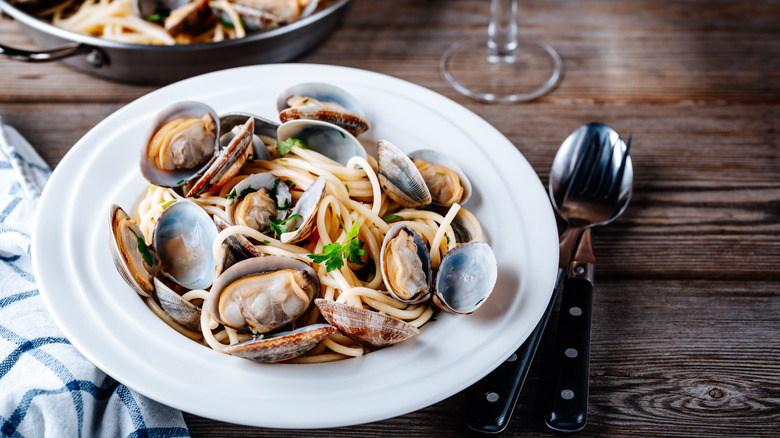The Real Reason You Should Avoid Ordering Mussels At Restaurants
Rich in protein and omega-3s, mussels may seem like the perfect choice for a meal out. A 3.5-ounce serving has only 120 calories and nearly 19 grams of protein, 3 grams of fat, and 4 grams of carbs, according to MyFoodData. You'll also get large doses of iron, calcium, vitamin C, selenium, zinc, and potassium. Eating mussels just three times per week can boost your omega-3 status in as little as two weeks, reports a 2019 study published in the journal Nutrients. Over time, this habit can improve your blood lipids and protect against heart disease.
What's more, these shellfish are sustainable to farm and can be cooked in a multitude of ways. "There's no protein on earth more sustainable than shellfish. And while most seafood sectors are fully maximized or declining, mussel aquaculture is growing and meeting the criteria of environmentally sustainable development," Australian mussel farmer Lance Wiffen told Medibank. Their flavor is delicious, too. Depending on your preferences, you can cook steamed or grilled mussels with garlic and lemon juice or try more complex dishes, such as fish stew, stuffed mussels, or paella.
But it's one thing to cook at home and another thing to eat out. Not surprisingly, ordering mussels at restaurants is like playing Russian roulette. "I don't eat mussels in restaurants unless I know the chef, or have seen, with my own eyes, how they store and hold their mussels for service," said celebrity chef Anthony Bourdain in his book, "Kitchen Confidential," reports The Guardian.
This is why you should skip the mussels when dining out
Chef Anthony Bourdain recommends skipping the mussels and fish, in general, when dining out. The only exception is when you pick a restaurant that specializes in seafood, according to Money Versed. As Bourdain wrote in his book, "Kitchen Confidential," most restaurants store mussels improperly without draining them before cooking (via Good Reads). Some places do have special containers, but that's not common, he added.
Seafood, including mussels, is prone to bacterial contamination and may lead to food poisoning. Plus, it may contain heavy metals, chemicals, and disease-causing viruses, reports Firstpost. Sometimes, shellfish become contaminated with infectious agents during processing, storage, or cooking. Salmonella, shigella, listeria, E. coli, and other bacteria found in seafood can all cause foodborne illnesses. People with compromised immune systems or chronic diseases may experience more severe symptoms, notes Firstpost. Additionally, seafood is often undercooked, which may further increase the risk of infection.
There is also a risk of cross-contamination, as some restaurants store mussels and fish in close proximity, cook them together, or use the same tools to prepare them. If, say, you order seafood salad and the fish is contaminated with E. Coli, the mussels on your plate may be contaminated, too. On top of that, Clostridium botulinum and other bacteria can cause life-threatening symptoms, such as respiratory failure and paralysis, according to the MSD Manuals. Given these risks, it's best to stay on the safe side and cook your favorite seafood at home.


